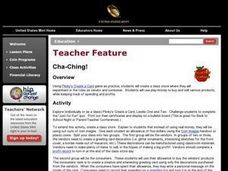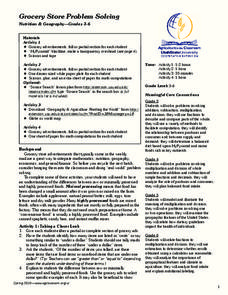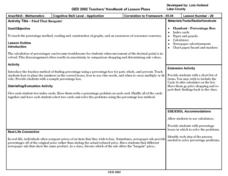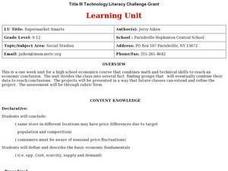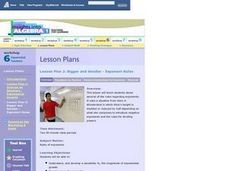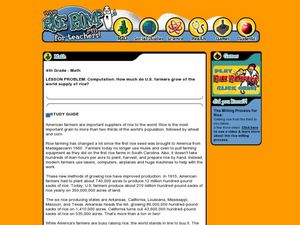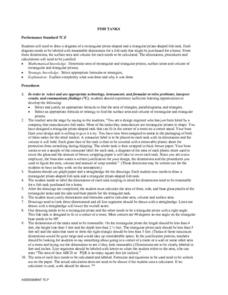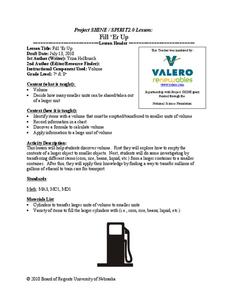Curated OER
Graph Those Stickers!
Students graph fruit. In this graphing lesson students create a graph using fruit label stickers. Students place a sticker on the graph when the fruit has been consumed.
Curated OER
How Much Money?
Sixth graders count money. In this money lesson, 6th graders count sets of coins and dollar bills. During specified activities, they total orders and calculate the amont of change a customer should receive. Students take turns...
Curated OER
Let's Go Value Shopping
Students count, figure change, and find the value of saving in a classroom store.
Curated OER
Percents: What's the Use?
Learners explore percentages in real world situations. In this percents lesson, students determine the final sales price after discounts. Learners interview community members and determine how percentages are used in the real world.
Curated OER
New York City Delights: The Taxi Cab
You set the rate! Step into the shoes of a taxi driver in New York City, and also pretend to be a person who uses taxis to get around town. The class will conduct collaborative research to learn about the history of taxis. Then, they...
Curated OER
Is Bigger Always Better?
Explore rational numbers with the young mathematicians in your class. They will investigate decimals, fractions, and percents before ordering and comparing rational numbers. This multi-day unit includes differentiation activities and...
Japan Society
Changing Times, Changing Styles: New Japanese Literary Styles of the Late Nineteenth Century
Focusing on Doppo's "Unforgettable People" and late nineteenth century Japanese literature, this resource also leads to discussions of form being dictated by content. Explore the development of new literary styles first-hand by...
Baylor College
Do Plants Need Light?
Turn your classroom into a greenhouse with a lesson plan on plant growth. First, investigate the different parts of seeds, identifying the seed coat, cotyledon, and embryo. Then plant the seeds and watch them grow! Measure the new plants...
Curated OER
Statistics and Shopping
Students explore the concept of using consumer data and statistics to aid in the consumer decision making process. In this consumer data and statistics lesson, students research consumer data and statistics. Students analyze the data...
Curated OER
Cha-Ching!
Students play the Pinky's Create a Card game for practice. Students create a class store where they experiment in the roles as vendor and consumer. Students use play money to buy and sell various products, while keeping track of spending...
Curated OER
Money & Work
Twelfth graders explain basic information concerning financial investments. They identify consumer rights and responsibilities and effective practices for purchasing consumer goods, services, housing and insurance. They list steps in...
Curated OER
Healthy Snacks. Healthy Packaging
Fourth graders research how to select the most cost-effective snacks. In this consumer practices lesson plan, 4th graders compare packaging labels and come to conclusions on how cost effective the product is. Students discuss their...
Curated OER
Transforming Food Energy: A Balancing Act
Students explain their role as consumers. They use a purchased calorimeter or make their own simple calorimeter to measure the energy content in selected foods. This interesting activity really gets students thinking about what they eat.
Curated OER
Grocery Store Problem Solving
Students use multiple math skills to complete grocery story problems. In this grocery math lesson plan, students study grocery ads to learn about the cost of foods. Students investigate food types and the costs of processed versus raw...
Curated OER
Food Chains and Endangered Animals
Students investigate how all links in the food chain are related. In this animal habitat lesson, students hypothesize about what would happen in the food chain if an endangered species were to become extinct. This lesson also includes an...
Curated OER
Find That Bargain!
Students explore the methods of calculating percentages, reading and the construction of graphs, and an awareness of consumer concerns in this lesson. The movement of the decimal point often results in uncertainty and confusion. This...
Curated OER
Supermarket Smarts
Pupils examine how a consumer can make informed choices. They visit stores with a prepared shopping list, record the prices on a spreadsheet, create graphs, and create a Powerpoint presentation comparing the total cost of stores and a...
Curated OER
Bigger and Smaller - Exponent Rules
Students study rules regarding exponents. It uses a situation from Alice in Wonderland in which Alice's height is doubled or reduced by half depending on what she consumes to introduce negative exponents and the rules for dividing powers.
Curated OER
Free Enterprise--Product Cost
Students apply basic math skills in computing a product cost.
Curated OER
How much rice to US farmers grow?
Fourth graders examine rice farming. For this rice farming lesson, 4th graders compute how much of the world's rice the US produces. Students gain information about the history of growing rice and how much rice other countries grow as...
Curated OER
Rate-of-Work Problems
In this rate-of-work worksheet, 9th graders read word stories and gather information. They write an equation for the story and solve the problem. There are five problems, with answers, provided on this one-page worksheet.
Curated OER
Fish Tanks: Volume and Surface Area
Given a very realistic challenge, your young geometers design residential fish tanks in rectangular and triangular prism shapes. They compute the volume of water each will hold. They also determine the size of plastic covers for each...
Curated OER
Fill 'Er Up
Students identify how many smaller units can be found in a later unit. In this geometry lesson, students calculate the volume and the transfer amount to a smaller unit. They solve real life problems using the formula for volume.
Baylor College
About Air
Give your class a colorful and tasty representation of the components of the mixture that we call air. Pop a few batches of popcorn in four different colors, one to represent each gas: nitrogen, oxygen, argon, and carbon dioxide. The...
Other popular searches
- Consumer Math Worksheets
- Consumer Math Projects
- Consumer Math High School
- Consumer Math Activities
- Consumer Math Lessons
- Percentage Consumer Math
- Consumer Math Food
- Consumer Math Simulations
- Consumer Math Using Catalogs
- Money Consumer Math
- Consumer Mathematics
- Consumer Math Projects 40s











